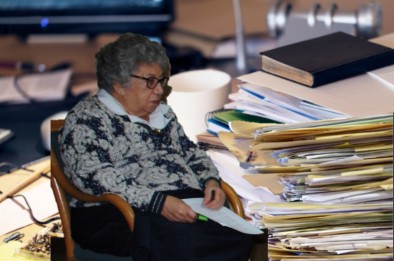By Mary Terzian
When I wrote Politically Homeless: a Five Year Odyssey across Three Continents, I addressed it to a general audience and, primarily, to educational institutions. I hoped that young adults, looking for a job at the completion of their education, would read it. My job search flung me half across the globe. Now my book has taken over the push. I did not expect three respectable organizations to extend their membership to me:
– Women of Distinction Magazine is looking forward to featuring you and your article. It will now be noted “Recipient of the 2016 Excellence Award ….”
– The Honors Department of The International Women’s Leadership Association (IWLA) selected Mary Terzian for her outstanding leadership skills, commitment to her profession and contributions her community.
– Continental Who’sWho has awarded a plaque to Mary Terzian as “Pinnacle Professional Member” inducted into Continental’s Who’s Who circle.
I am certainly honored to be a member of these organizations. Authors never know where their Masterpiece will land, and it is always a pleasure to find out that their book has touched deep feelings, which is essentially the purpose: to shake and wake the reader to alternative realities. Will I ever make it to the Pulitzer Prize? Doubtful, but it is alright to keep the dream alive. Here is an excerpt from Chapter One of the book. You be the judge.
“Your place is in the kitchen,” Father thundered, his green eyes bulging from their sockets.”You don’t need more education. You had more than enough already for a girl.”
That phrase, “for a girl,” seared my soul ad infinitum, whether for higher education, going to the movies, attending cultural events or just belonging to a club. Those activities were reserved for boys. I was the extra hand at home, Stepmother’s helper, if not her replacement. I would become a spinster for life if a suitor didn’t ask for my hand soon. In the 1950’s that was the normal expectation from Armenian girls in Cairo who were lucky enough to complete high school.
“You can’t feed a husband with books! You’re a woman!” Stepmother echoed, “you’re destined to keep house!” as if I wasn’t doing it already.Housekeeping is no brainer for heaven’s sake! How long does it take to tidy up a place, or learn to fold grape leaves over seasoned ground meat to make sarma or stuffed dolma? When did a housekeeper ever win a Nobel Prize?
I looked at my parents with glassy eyes, pursed lips and a poker face, an acquired habit developed at the Immaculate Conception English High School in Cairo where I had just graduated. The Irish nuns had helped me gain self-confidence. Otherwise I would have lost my temper and hollered back at my parents, an unforgivable sin. Father accused them of “raping my mind.” He didn’t suspect that they saved my life, by diverting my suicidal thoughts towards hope and patience. Sister Mary Visitation taught us a phrase that is etched on my brain to this day: “I can and I will.”There and then I made up my mind. “I will challenge that destiny. You can’t stop me!” Without that promise to myself I would have burst into a volcano from the anger piled up in me.
School, my only escape, was over now and I felt like a caged bird.
“I told you several times to quit reading those stupid books,” Father lamented, “You never listened to me! They’re useless when you’re hungry! Learn to sew. Start learning a trade, otherwise you’ll starve!”
Four years earlier my high school education had been threatened the same way. Had it not been for my older brother Kev’s sneaky intervention reporting to Aunt Esther about my staying at home, I would not have had the opportunity to attend secondary school at fourteen. Aunt Esther kept an eye on us. She had intervened on my behalf while Uncle Avedis, Mama’s brother, was still alive, his presence giving more weight to her authority then. It was different now.
“What’s the use of your education now, tell me! After all that money spent on you!” Father grieved. He sounded as if it were a waste.
Survival had been the preoccupation of my parents’ generation. The Armenians living in Aintab, Mother’s ancestral town, and those in Killis, Father’s birthplace, had witnessed the emaciated shadows of human beings marching through their town. They were dispatched to their death in the hot, arid Syrian deserts, their only sin being a Christian. They were mostly seniors, women and children. The able-bodied men, fourteen years old and over, had been taken care of, Ottoman style. History labeled these once industrious, then impoverished individuals “starving Armenians,” adding insult to injury. The majority perished on the road for want of a drop of water, a slice of bread, or a shelter from threat. Few survived.
Fearing the same fate of deportation and massacres of infidels could befall them, and unable to defend themselves any more, those who could escape left their town overnight, following the departure of the French Army after the signing of the Armistice on November 11, 1918. The French left behind not only the areas they had conquered, but also their promises of helping the population to take over their ancestral lands.
Father’s family was among the escapees. They probably endured hunger during their voluntary displacements. Although we never had a shortage of food at home, and during World War II we were reasonably rationed, his memory and fears lingered. He humbly picked up the last precious crumbs of bread from the table as if they were particles of Holy Communion. World War II had revived the apprehensions of the immigrant Armenian community that had barely found its footing.”What will happen to us now?” was the common worry.
Egypt, then a British Protectorate, had been hospitable to these impoverished remnants of a proud nation who wanted to keep their identity intact. The local Egyptian-Armenian communities had extended a helping hand to facilitate the integration of the arriving compatriots. Charitable organizations and benevolent patrons had financed the education of children whose parents could not afford tuition in Armenian schools. Father, however, was a proud man. He would never accept help from anyone. He paid for our education, Kev’s and mine, but he considered sending me to school a “waste of money”.
“Why does she need education? If she can read that’s enough! She’ll stay home and rear children.”
Mother was adamant. She was a woman ahead of her time: well-educated, insightful, and intelligent.
“Times are changing. Mary should be educated at the same level as the boys. Don’t you see the women working in the Army nowadays?”
“Berj will soon start kindergarten. I have to provide for him too. He’s a boy. He needs it more.”
“God will send his kismet just as He did when he was born. Don’t sacrifice the girl for him!”
 n my words and rely on dictionaries. When I can’t find the exact word that does justice to my tale, I spend hours chasing the exact word in different dictionaries until my need is satiated.
n my words and rely on dictionaries. When I can’t find the exact word that does justice to my tale, I spend hours chasing the exact word in different dictionaries until my need is satiated.



